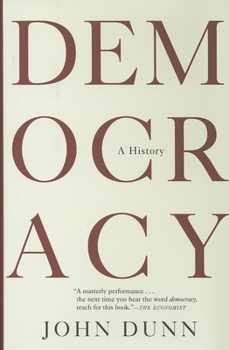Democracy: A History
Select Format
Select Condition 
Book Overview
For the last twenty-five years, fostering democracy around the world has been a cornerstone of U.S. foreign policy. Why is democracy so important today? Why should it hold such sway over the political speech of the modern world? In Democracy: A History , John Dunn - England's leading political theorist -- sets out to explain the extraordinary presence of democracy in today's world. The story begins in Greece, where it began as an improvised remedy...
Format:Hardcover
Language:English
ISBN:0871139316
ISBN13:9780871139313
Release Date:June 2006
Publisher:Atlantic Monthly Press
Length:248 Pages
Weight:0.95 lbs.
Dimensions:0.9" x 6.0" x 9.0"
Customer Reviews
2 ratings
challenging, fascinating, a little repetitive
Published by Thriftbooks.com User , 16 years ago
This is not an easy book to read. The phrasing is peculiar and the sentences are frankly long; it is easy to lose the author's main points. Having said that, the story is fascinating and worth knowing: how an obscure and idiosyncratic idea born in Athens came to dominate world political thought 2000 years later with nary a single legitimate contender for the title. In particular its rebirth in the late 1700s in the throes of the American and French revolutions is particularly relevant to today's world. The Federalist Papers are discussed in relation to the development of the American Constitution and its specific mode of 'democracy' (ie, representative). The review above mentions one of the author's principal lines of inquiry, the distinction between American-style 'egoism' (ie, individualistic capitalism) and Reign of Terror-style 'equality' (ie, redistribution of wealth). I found this book exciting and it has inspired me to read more about both the American and French Revolutions, as well as democracy, the American Constitution, and different forms of government. It's a short book; dense but readable especially the meat of the book after the introduction.
Democracy: egoism equilized
Published by Thriftbooks.com User , 16 years ago
Dunn studies the history of the word and the idea of democracy from its inception in Athens, suggests why it went dormant for 2000 years, then picks up the study again with the American revolution and the French Revolution. But this isn't primarily a linguistic or historical exercise, but rather a study of democracy as a process ("democratization") and as a form of government ("capitalist republic"), and a study of how the word "democracy" has been co-opted and changed and why it still has power today. Dunn seems democracy as a split (framed in philosophy by Sieyes and in practice by Robespierre during the French Revolution) between equality and "egoism" - Ayn-Randian capitalism, basically, is how I'd describe Dunn's use of the word. The American experiment resolved the dialectic (Marxism is dead as a form of government but not forgotten as a way of thought) in favor of egoism by accepting limits on equality, with controls on egoism as envisioned by Madison in Federalist No. 10. This framed the success (i.e. avoidance of Terror) of the American revolution, while taking the practice of democracy as a form of government another step removed from the original Athenian definition and practice. This salvation and distress is the form in which democracy has conquered the world. Dunn restates and sometimes overstates the uniqueness of his question, but the study is a worthy one.






